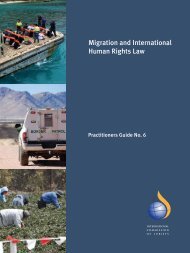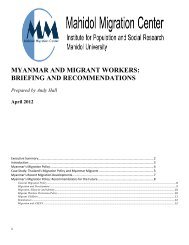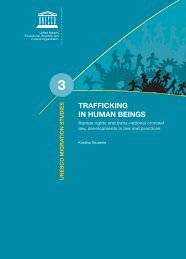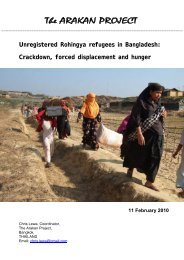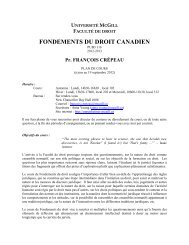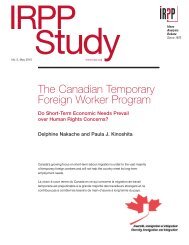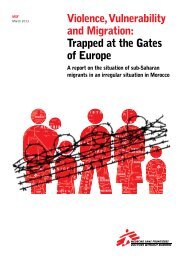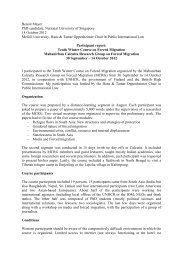Access to Justice for Migrant Workers in BC - West Coast Domestic ...
Access to Justice for Migrant Workers in BC - West Coast Domestic ...
Access to Justice for Migrant Workers in BC - West Coast Domestic ...
Create successful ePaper yourself
Turn your PDF publications into a flip-book with our unique Google optimized e-Paper software.
permanent residence. One caregiver reported that she was <strong>for</strong>ced <strong>to</strong> sleep <strong>in</strong> an unheated<br />
garage <strong>in</strong> the middle of w<strong>in</strong>ter with no access <strong>to</strong> <strong>in</strong>door plumb<strong>in</strong>g. At night, her employer<br />
locked her out of the ma<strong>in</strong> residence and <strong>in</strong>structed her <strong>to</strong> ‘go outside’ if she needed <strong>to</strong> use<br />
the washroom. Some caregivers also noted that they are reluctant <strong>to</strong> leave bad employment<br />
situations because they would be rendered homeless as a result, particularly if they do not<br />
have a prospective employer and work permit <strong>in</strong> place.<br />
Gilliard highlights that the live-<strong>in</strong> requirement of LCP also can lead <strong>to</strong> the development<br />
of a situation where the caregiver is seen as ‘one of the family’, and <strong>in</strong> this situation is<br />
vulnerable <strong>to</strong> emotion or moral manipulation. 81 WCDWA’s research confirms that caregivers<br />
often do feel obligated <strong>to</strong> do work beyond what is stipulated <strong>in</strong> their contract because of<br />
emotional bonds with the family. Even from the po<strong>in</strong>t of view of an employer who is<br />
generally law-abid<strong>in</strong>g and well <strong>in</strong>tentioned, the live-<strong>in</strong> requirement blurs the l<strong>in</strong>e between<br />
‘employee’ and ‘family member’ and can lead <strong>to</strong> violations of employment standards that,<br />
while not deliberate, are nevertheless unfair.<br />
Agricultural <strong>Workers</strong> and Liv<strong>in</strong>g Arrangements<br />
Due <strong>to</strong> a lack of effective moni<strong>to</strong>r<strong>in</strong>g and en<strong>for</strong>cement of liv<strong>in</strong>g arrangements,<br />
accommodation conditions <strong>for</strong> agricultural workers vary with employers. Thus, one worker<br />
<strong>to</strong>ld the research team that he was housed <strong>in</strong> a brand new hotel-like build<strong>in</strong>g, while the<br />
research team was also <strong>to</strong>ld of workers who were be<strong>in</strong>g put up <strong>in</strong> un<strong>in</strong>habitable build<strong>in</strong>gs<br />
that lack basic necessities such as electricity and runn<strong>in</strong>g water. One community worker<br />
spoke of houses without laundry facilities, which meant that workers could not wash their<br />
work clothes <strong>in</strong> a timely manner after long work days and were <strong>for</strong>ced <strong>to</strong> re-wear soiled and<br />
dirty clothes. Most of the workers the team spoke <strong>to</strong> described accommodation cover<strong>in</strong>g<br />
their basic needs but no more. In one case, workers reported shar<strong>in</strong>g bedrooms with bunk<br />
beds hous<strong>in</strong>g four men <strong>to</strong> a room, shar<strong>in</strong>g one bathroom and one kitchen between ten<br />
men. In response <strong>to</strong> a question about the social dynamic <strong>in</strong> a shared home, most workers<br />
<strong>to</strong>ld the team that despite the lack of privacy, everyone normally gets along and the<br />
workers normally develop a rotat<strong>in</strong>g schedule, which allows them <strong>to</strong> share the s<strong>in</strong>gle<br />
bathroom and kitchen <strong>in</strong> the morn<strong>in</strong>g. Arguments do occur but the workers are <strong>for</strong>ced <strong>to</strong><br />
adapt <strong>to</strong> the shared liv<strong>in</strong>g space. In <strong>BC</strong>, where employers can recover accommodation<br />
costs through payroll deductions, some workers compla<strong>in</strong>ed that the quality of the<br />
accommodation provided was not commensurate with the rent paid.<br />
The lack of choice with regards <strong>to</strong> liv<strong>in</strong>g arrangement can add <strong>to</strong> social isolation and<br />
exclusion. Many SAWP workers the team spoke <strong>to</strong> depend on their employer <strong>for</strong><br />
transportation <strong>to</strong> the nearest <strong>to</strong>wn. Once every two weeks, workers are driven <strong>to</strong> the bank<br />
and grocery s<strong>to</strong>re <strong>to</strong> buy the supplies they need <strong>for</strong> the com<strong>in</strong>g weeks. Some workers<br />
<strong>in</strong><strong>for</strong>med the team that on their days off, they would ride their bikes <strong>in</strong><strong>to</strong> <strong>to</strong>wn <strong>to</strong> meet up<br />
81<br />
Julia Gilliland, “Permanent Worker, Temporary Resident: Media Representations of Canada’s Live-In Caregiver<br />
Program” (master’s thesis, University of Vic<strong>to</strong>ria, 2012,) 34, http://dspace.library.uvic.ca:8080/handle/1828/4225show=full.<br />
32




